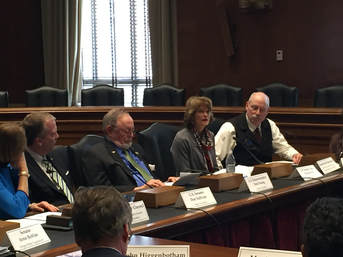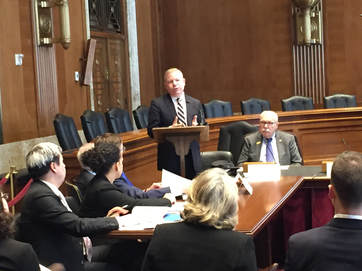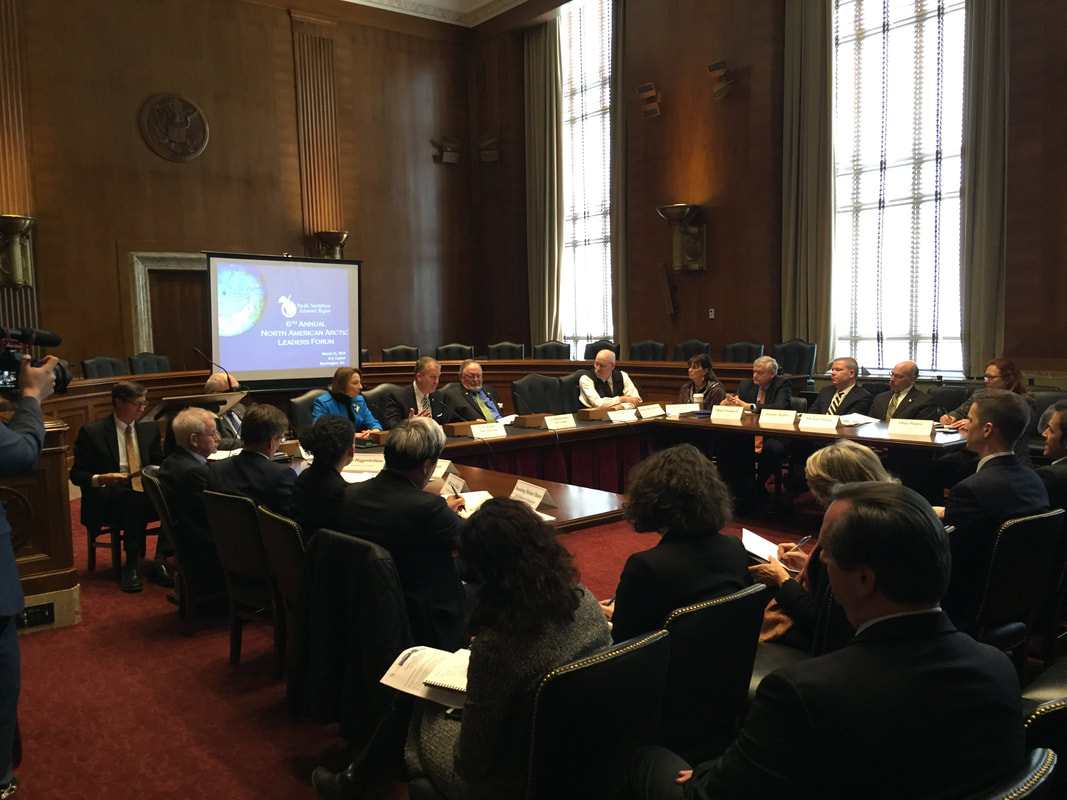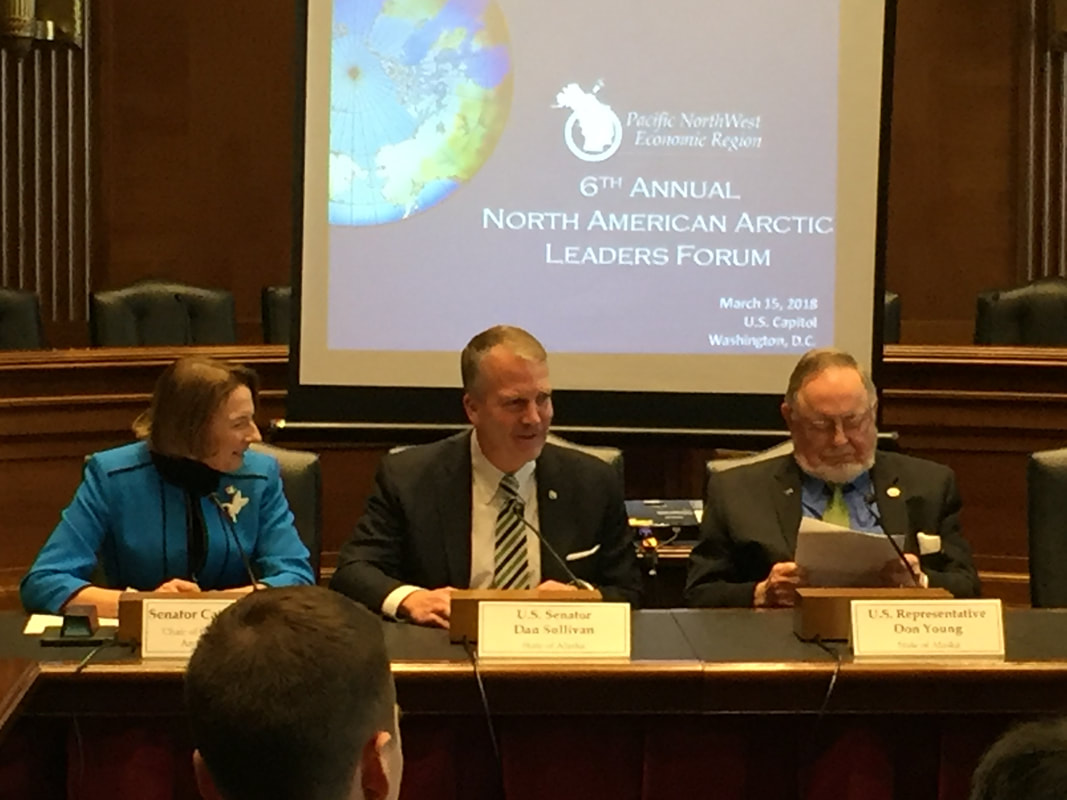Alaska Congressional Delegations headlines PNWER's North American Arctic Leaders Roundtable3/23/2018
 State Senator Bert Stedman (from the right to left) Senator Lisa Murkowski, rep. Don Young, Senator Dan Sullivan and State Senator Cathy Giessel. State Senator Bert Stedman (from the right to left) Senator Lisa Murkowski, rep. Don Young, Senator Dan Sullivan and State Senator Cathy Giessel. Senator Lisa Murkowski spoke about the need to have more administrative officials understand the importance of the arctic. It cannot be the sole responsibility of Alaska officials; U.S. officials need to be educated on and advocate for arctic policies, especially policies that will endure past the current Presidential Administration. Almost all U.S. agencies have a role to play in the arctic and they need to breakdown internal silos and be more collaborative with one another. It is challenging to work with each individual agency with various arctic initiatives. Additionally, the Arctic Circle will highlight Alaska at its annual meeting in Iceland, as well as the importance of shipping in the arctic and sharing icebreaker infrastructure in North America. Rep. Don Young spoke to the challenges of working with the federal government and the need for more collaboration with the State of Alaska. He emphasized the importance of working with the International Maritime Organization (IMO) on a system for transiting the Arctic in North America. Transportation infrastructure and arctic policy with regional leaders through roundtables and consultationTransportation infrastructure and arctic policy with regional leaders through roundtables and consultation. Issues were raised during the panel discussions and roundtable of bilateral concern. Oil and gas development in Alaska could pose a threat to the porcupine caribou herd that migrates across the region. According to U.S. officials, there are vacancies on the International Porcupine Caribou Board, a body established by a bilateral agreement to address issues with the herd. Moreover, sufficient oil spill response equipment is another area in need of transboundary attention. Representatives from Canada emphasized the systemic nature of the Arctic, and any environmental disaster will not be confined to its source. Communication BarriersJohn Higginbotham, Centre for International Governance Innovation (CIGI) spoke about the need for the governments to work together especially on Arctic policy and the importance of the prime minister and president to work together on arctic issues. Adrianna Muir, Deputy Senior Arctic Official from the U.S. State Department spoke about the need for all levels of the federal government agencies to communicate across silos. This theme was mentioned during Senator Murkowski’s remarks on fixing communication barriers across the federal government. She also recognized Alaska’s role as a leader in the Arctic. Senator Stedman added that arctic communities want infrastructure and desire to see their communities share in the same technological advancements as other U.S. cities. Arctic Shipping Speaker: Jeremy Mathis from the National Oceanic and Atmospheric Administration. Speaker: Jeremy Mathis from the National Oceanic and Atmospheric Administration. Shipping infrastructure is critical to the economic viability of the Arctic, and may also present the best business plan for the region. An Arctic Seaway that guarantees port access, icebreaking services, and search and rescue capabilities could reduce liability for international transport companies. The plan’s user fee model could recoup infrastructure construction and operating costs as shipping traffic is expected to increase in the Arctic. Mike Sfraga from Wilson Center Polar Initiative, Mead Treadwell, PT Capital and Jeremy Mathis, National Oceanic and Atmospheric Administration spoke about the opportunities for arctic shipping in the region and outlined a couple innovative ideas on working together on transiting the region. An example of similar program conducted in the St. Lawrence Seaway was showcased as a possible solution for collecting fees for managing the northwest passage waterway. When a ship transits the waterway, the U.S. and Canada coordinate with each other throughout a ship’s transit. Some challenges exist as far as infrastructure and rules for ships traveling through the region. Additionally, Canada and the U.S. still have a dispute on sovereignty of the region and the national border. More work needs to be done in both countries to create a shared system for monitoring ships and collecting fees for managing the waterway. The Wilson Center is hosting a conference on Arctic port infrastructure later this summer. ConclusionThe event concluded by looking towards the future. In particular, the roundtable discussed the proposed Alaska LNG pipeline and potential Chinese investment in the project. China and Alaska have signed memorandum of understanding to develop the project with a percentage of the gas supply guaranteed for the Chinese market. The Roundtable was an exciting chance for arctic experts to share ideas and topics impacting the North American Arctic. ResourcesSteve Myers, Senior Program Manager, PNWER and Michael Mauer, M.A. Candidate, May 2018, International Economics & Conflict Management, Johns Hopkins School of Advanced International Studies (SAIS) contributed to this article.
Comments are closed.
|
Archives
August 2023
Topics
All
|
|
World Trade Center West
2200 Alaskan Way, Suite 460 Seattle, WA 98121 |
|


